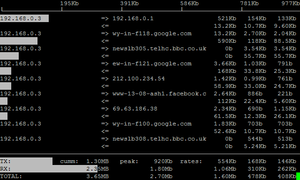Iftop is a free software command-line system monitor tool developed by Paul Warren. It produces a real-time stream of incoming and outgoing network communications from the operating system iftop is running within.[2] By default, the connections are ordered by bandwidth usage, with only the largest ("top") bandwidth consumers shown. It is analogous to top, but instead of system-wide resource monitoring, it focuses on displaying just network usage. Iftop is typically used for monitoring bandwidth consumption, and while investigating unknown consumers of available network bandwidth.
This article needs additional citations for verification. (February 2024) |
 | |
| Developer(s) | Paul Warren |
|---|---|
| Initial release | March 2, 2002[1] |
| Stable release | 0.17
|
| Repository | https://code.blinkace.com/pdw/iftop |
| Written in | C |
| Operating system | Unix-like |
| Type | Bandwidth usage / System monitor |
| License | GNU General Public License |
| Website | www |
Description
iftop are passive monitoring tool. This program monitors network traffic and displays a table of current bandwidth usage, bandwidth measured in bits per second at default, and may be changed to bytes per seconds with the command line option.[3]
An interface may be specified' if not, it will listen on the first interface it finds that appears to be external.
By default, iftop will look up hostnames associated with addresses and counts all IP packets that pass through the filter.
A feature of iftop is that it can suppress display of DNS traffic by using a filter code such as "not port domain", or switch it off entirely, by using the -n option or by pressing "n" when the program is running. Using the -F option makes it possible to show packets entering and leaving a given network.
iftop may be used for inspecting TCP or UDP ports also, using the option -P.[3]
See also
- Linux/UNIX system performance commands
- htop
- netsniff-ng's ifpps top-like statistics tool
- ntop
- MTR (software)
- List of Unix commands
References
External links
Wikiwand in your browser!
Seamless Wikipedia browsing. On steroids.
Every time you click a link to Wikipedia, Wiktionary or Wikiquote in your browser's search results, it will show the modern Wikiwand interface.
Wikiwand extension is a five stars, simple, with minimum permission required to keep your browsing private, safe and transparent.
